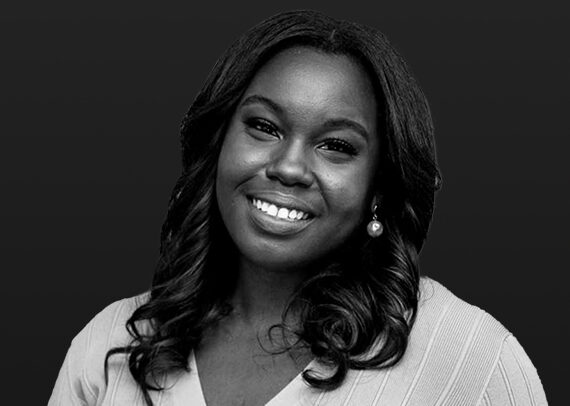Effective Communication Tips for Founders | Tory Burch Foundation
Effective Communication Tips for Founders
Get others to see your vision–and your business–clearly.
35,394 Views
5 Likes
5 min read
Link copied to clipboard
The old adage “build it, and they will come” doesn’t always work for founders. As an entrepreneur, you need to be able to speak about your product and yourself in a way that’s clear and convincing. In one of our small business webinars, Charmaine McClarie, an executive coach who’s worked with founders and leaders at major corporations like Coca-Cola and Johnson & Johnson, offered key insights about finding and owning your story, plus effective communication tips for founders when speaking to a range of stakeholders.
WHY STORYTELLING MATTERS.
Being able to explain who you are and what your company does goes beyond selling it to investors or customers. Your story, McClarie explained, is about having a vision so that others aren’t able to control the narrative. She demonstrated with her own story first. “I don’t say to [people who ask] that I’m an executive coach, because they may have read an article last week that said all executive coaches are overrated. So that would have been somebody else defining me,” she said. Instead, she summarized her business as, “I help smart people get promoted and communicate the big picture about themselves and their organizations across the globe.” That change in the standard introduction epitomizes McClarie’s belief that effective communication means being able to shift the focus from not what a founder produces but to who they are and what they achieve.
Being solid in your story can also drive the business itself. “Having a vision will allow you to pivot,” she said. McClarie asked the audience to imagine a hypothetical babysitting service. With the pandemic keeping parents home and canceling date nights, that babysitting service has to do things differently if it wants to survive. McClarie said that in this example, the owner of the babysitter has defined their vision as bringing “greater joy and ease” into the lives of clients. With that in mind, the service can pivot to things like dog walking or grocery shopping because those services support the purpose of making lives happier and simpler. “Your winning story makes you unstoppable,” she continued.
HOW TO DEVELOP YOUR FOUNDER’S STORY: IT STARTS WITH YOU.
To help founders tell their stories, McClarie has clients ask themselves three key questions: what image do you have of yourself? What image do others have of you? And lastly, what image do you want others to have of you? As you answer those questions, you should think about how those answers create an experience for your customers or clients. “What does that feel like? What is that difference? That is so powerful,” she explained.
Once you’ve started to shape the answers to these questions, you’ll have to whittle them down to a message that’s attention-grabbing and sums up three main points you want a potential partner or other stakeholder to take away from their interaction with you. McClarie calls this speaking in headlines. Your headlines need to explain why a partner, client or customer should listen, what’s in it for them and what action you want them to take.
Your winning story makes you unstoppable.
It’s important to note that your headlines will differ depending on your audience. That doesn’t take away from your authenticity; it shows that you understand different audiences likely have different needs or interests. “You want to make sure that you articulate not only the hook, but the outcome. What’s going to be different in their life as a result of them using your service?” she elaborated.
When building a vision for your company, make sure to keep yourself in it. “I’m a believer that your lived experience is a competitive advantage,” she explained. “Everything about your life has brought you to this point.” Honoring your experiences will help you differentiate yourself from others in your field–a key component of building your story. “You want to dig deep, and be willing to risk being vulnerable.”
PRACTICE (AND FEEDBACK) BUILD CONFIDENCE.
You can memorize your three must-make points but they won’t land unless you truly own your belief in your business and value proposition. “Don’t audition for the part,” McClarie instructed. “You know that you’re the owner of the business. Act like the owner; know that your product or service is brilliant.” She observed that it’s very easy for founders to underestimate themselves and their value. Ask trusted peers and mentors for feedback about your business and how you appear to refine your approach. In addition, be sure to listen to what your fans (and detractors) have to say.
McClarie shared a tactic she developed after hearing from her peers that she came across as austere. She’d write out her script, with special attention to what she asked for and how she asked for it.“I would have a mirror in front of me, because what people hear is what you’re looking at.” Being able to see a very real reflection of how she came across helped her change her tone and approach. She also kept refining her script and practicing both the words and the tone of her delivery.
Another tool for building confidence in how you communicate your vision is your voicemail. She recommended that just before a major meeting or event, founders leave themselves a voicemail listing all their accomplishments and qualities to get them in the right mental space. “There’s nothing like it. Because you are affirming yourself, which is the most powerful person to affirm you.”
Sign up for our newsletter to find out about our upcoming webinars and other programs.
Help an entrepreneur by upvoting


